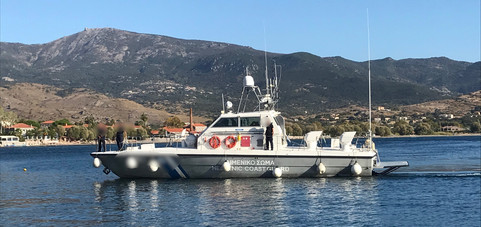Internal documents from the EU’s border agency Frontex offer insights into possible illegal pushback of asylum seekers.
The bulk were drafted by people under the aegis of Frontex, operating off the Greek coastal islands and describe, sometimes in detail, how Hellenic authorities engage in preventing migrant arrivals at sea.
Although some of these documents have been reported in the past, the full extent of the ensuing correspondence offers a closer glimpse into the allegations.
Also known as “serious incident reports”, the documents were obtained by German pro-transparency group FragDenStaat [Ask The State] and then shared with EUobserver on Friday (5 March).
Such documents are classified by four categories, with the fourth being violations on fundamental rights.
The documents are said to be few in number, a reason Frontex attributes to not having people deployed in the frontline to witness violations.
But others claim Frontex officers are in fact actively discouraged from filing the reports to avoid repercussions later on.
The affair came to a fore after a joint-investigation last October by Bellingcat and others revealed six alleged pushbacks involving Frontex.
The media spotlight has since cast a long shadow over the Warsaw-based agency as well as its executive director, Fabrice Leggeri.
Out of the seven serious incident reports shared with this website, five deal with allegations against Greek authorities, while the remainder describe separate incidents in Germany and Hungary.
The five also figure in a 18-page final report by an internal probe, known as the working group, into Frontex.
The most recent dates from November of 2020 and is based on testimonies from the migrants.
They describe how the Hellenic Coast Guard make waves, to push rubber boats back into Turkish waters.
“One of the Greek officers even took out a large pointy object and gesticulated with his hands for them to turn back to Turkey,” notes the report.
The migrants were later escorted to the Greek island of Kos.
But Hellenic authorities later disputed the account, describing the case as an illegal border crossing.
Another incident near the Greek island of Chios, reported in October 2020, provides a direct account by a Swedish Frontex officer.
The officers had started their patrol in the early morning and soon found a rubber boat, fitted with an outboard engine, carrying some 20 migrants, including children.
“Soon I saw a vessel coming from Chios Port heading straight towards us. It was the HCG (Hellenic Coast Guard),” notes the Frontex officer in the report.
Greek coast guard arrives
The officer said he then saw an HCG crew member with ropes and mooring lines on the aft of the vessel.
They were then told to the leave the scene – but followed the incident on radar.
“On the radar screen we could follow the echo from the HCG Vessel, slowly moving towards the TUR (Turkish) borderline,” says the document.
Another serious incident report dated August 2020 took place near the Greek island of Lesvos.
It says a rubber boat with some 60 migrants had been detected in the early morning hours.
The report says “there is information” that the Hellenic Coast Guard then towed the boat towards Turkish waters.
It then notes the migrants “were pushed back to Turkish territorial waters by the Greek Coast Guard.”
The Greeks deny it, saying the boat had in fact returned on its own after a confrontation.
In July 2020, a Danish helicopter used by Frontex detected some 25 migrants on boat near the Greek island of Chios.
It then left after the arrival of the Greek authorities, who then say the Turks took back the people.
In April of the same year, Frontex surveillance aircraft spotted a rubber boat with migrants.
The Hellenic Coast Guard took them onboard. The rubber boat’s outboard engine was removed. The migrants were then placed back onto the rubber boat and set adrift in Turkish waters.
The whole incident had been live-streamed in the Frontex headquarters in Warsaw.
“The situation was a little bit strange,” Leggeri admitted of the incident, when speaking to MEPs last December.
But he also said it took place in the context of Turkish and Greek military tensions, noting the presence of F-16 fighter jets in Greek airspace.
For their part, the Greeks say none of the migrants had requested asylum.
Source: EU Observer



